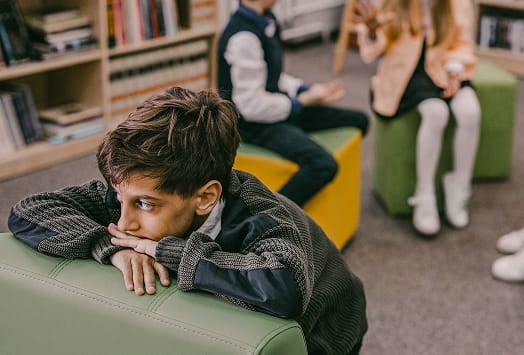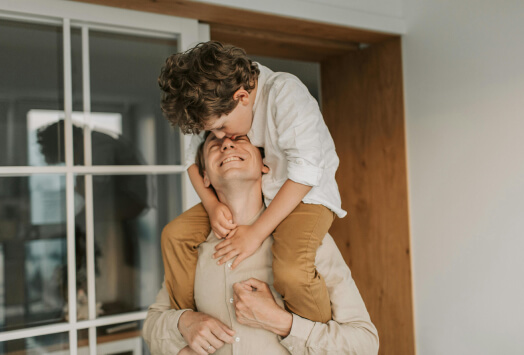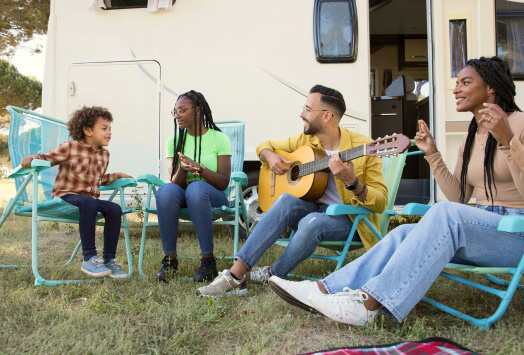Most parents remember a time before social media and Smartphones. But for children, social media and Smartphones have always been around. Of course, parents and guardians want to protect their children at all costs. However, when it comes to social media, it is difficult to determine the right course of action.
Every child and family is different, so what works for one might not work for another. In this article, we will outline some of the frequently asked questions and concerns about social media for kids and give advice based on research and expert opinions. However, the best advice we can give is to listen to your own instincts as well as your child. As their parent/guardian, you know best. We encourage open communication with your child so that you can come to a decision together.
- Risks of social media for children
- Social media safety
- Benefits of social media for kids
- Social media apps for kids
- Is social media bad for kids?

Risks of social media for children
Social media comes with risks for children and even adults. Most families start the kids’ social media conversation with the inherent risks of allowing their children onto social media. Here are some of the risks of social media for children as well as effects of social media on children, which are important to keep in mind as you determine if your child should be allowed on social media.
- Cyberbullying. When children go on social media, they open themselves up to cyberbullying (or to become bullies themselves). According to research done by StopBullying.gov, 16% of high school students experience cyberbullying. Use this guide written by our early childhood learning expert if you learn that your child is being bullied.
- Constant comparisons. Adults experience this problem with social media as well, but for children, tweens, and teens it can be even more difficult. Social media offers a curated look at someone’s life, but opens the doors for comparisons and can cause children to feel less than their peers.
- Decreased mental health. Constantly comparing themselves to others, experiencing FOMO (fear of missing out), potential bullying, lack of sleep, and so many more issues that come with social media can lead to depression, anxiety, and other mental health concerns for children.
- Inappropriate digital footprint. When children, tweens, and teens have social media, they have opportunities to start creating their digital footprint when they are too young to know what that really means. Even as adults, we sometimes cringe at what we wrote on Facebook 10 years ago. Now, these children are even younger and might end up posting picturs, videos, and content that will make it harder for them to get into college or even get a job later in life.
- Exposure to dangerous or inappropriate people and content. Social media connects children to the wider world. It opens them up to meeting dangerous people as well as viewing inappropriate and/or harmful content.

Social media safety
Now that you have some knowledge about the risks of social media for children, we can discuss ways to keep your child safe on social media. These social media safety tips can help combat those risks.
But, it is important to note that even a child who has all of the right safety protocols in place can get into trouble on social media. Keeping a close eye on your child’s social media accounts and having open communication about social media with your child is the best way to keep them safe online.
- Friend/follow your child’s social media accounts. Allowing your child to have social media is a privilege that comes with some assumptions. They need to let you have the ability to friend/follow their accounts just so you can make sure everything stays safe.
- Limit screen time. Create rules around screen time to make sure they are not spending an excessive amount of time on social media. Meals, after a certain time in the evening so it doesn’t ruin their sleep, and during school are good places to start. Not sure how to get your child to put away their screen? Use our guide.
- Set up privacy settings and turn off location. Children might not understand the identity theft and other privacy concerns that come with social media. Make sure your child has their privacy settings fully turned on and their location turned off. Plus, talk to them so they know not to share personal data (full name, address, phone number, email address, passwords, credit card numbers, etc) with anyone.
- Encourage your child to think twice before hitting “enter”. To protect your child’s online reputation as well as to help ensure they don’t forget their manners because of the anonymity of online accounts, encourage your child to think twice before posting anything. Have a frank conversation about digital footprints so they know that what they post will be there forever.

Benefits of social media for kids
Yes, there are some benefits of social media for kids! With the right scaffolding, social media can help children in a number of ways.
- Staying connected with family and friends. Social media can help children stay in touch with long distance friends and family members. These ties are important to children and can be very beneficial as they grow and develop into adults.
- Finding like-minded peers. Some children struggle with social interactions in person. On social media, they have the opportunity to find children who share similar interests. Plus, there is less pressure when interacting online, so these children can be social, too.
- Connecting to the wider world. Social media can help children expand their worldviews. By learning about peers in different towns, cities, states, and countries, they can gain empathy and perspective that will help them grow into more well-rounded individuals.
- Enhancing creativity. By sharing, viewing, and talking about art, music, books, and more, children can use social media to enhance their creativity and learn more about themselves.
Social media apps for kids
If your child is insistent on social media, what are the best social media apps for kids? Can you help your child find ones that are safer, at least to start out? If your child wants to use social media to connect with their friends online, we recommend speaking with the parents/guardians of your child’s friends so that you can all agree on the same app.
- Grom Social. This is a social media app just for kids. Parents also make an account and then they can control personal data as well as monitor their child’s posts, comments, interactions, and more. This app also uses both AI and humans to moderate content and ensure everything is safe for children. Finally, anyone over 16 is considered an adult on Grom and cannot interact with children on the app.
- PK XD Universe. This is a virtual world building game that children can play with one another. They can chat with each other in the app, but the system only uses pre-written phrases, which helps to make it more safe for children.
- Girl2Girl Wall. Kind of like the chatrooms of old, Girl2Girl Wall allows girls to pick a topic and then chat with one another, ask advice, share opinions, and make friends. It is only for girls aged 8-15 and all content is moderated by humans before it is posted.
- Roblox. Roblox is technically a game platform, but it included a social networking aspect because users can chat with one another. It is one of the most popular online games among children. They use human and AI content moderation as well as offer many parental controls to make the platform safer for children. Learn more about Roblox for kids in our article.

Is social media bad for kids?
This is the million dollar question. Unfortunately, there is no right or wrong answer. Social media is complicated and its effects on children are not fully understood yet. Most experts agree that too much social media is bad for kids. Likewise, unchecked social media can be harmful for children. With the right scaffolding and communication between children and their parents/guardians, social media can help children grow into more empathetic, worldly adults.
Right now, it might seem like social media is a necessary evil for children. If that is the case, we recommend keeping a close eye on their accounts and having many open conversations. Even if your child messes up on social media, we recommend thanking them for their honesty, forgoing the punishment, and working together to come up with a solution.
You got this!
















